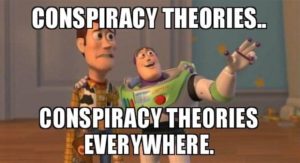Aug
21
2018

I hate the headline of the Independent article about this new study – “Scientists discover the reason people believe in conspiracy theories.” No, they didn’t. What they potentially found was an additional factor that predicts conspiracy thinking, meaning that it correlates with it. A much better headline would be – “Scientists find that believing in final causes correlates with conspiratorial thinking,” or something like that.
I understand the need to make headlines eye-catching, but you can do that without misrepresenting the science. The body of the article itself, while it does a decent job of explaining teleology, also misrepresents the implications of the study in a typical way – it fails to put it into the context of existing research.
Mainstream science reporting often follows a typical narrative – we essentially knew nothing, then scientists made this breakthrough discovery, and now we fully understand “the” cause of whatever.
The real scientific narrative is often quite different – we know something about this complex phenomenon, but there is still much that is not known, and now scientists have added one more piece to the puzzle. This is actually, in my opinion, a far more compelling narrative, but you have to tell the whole story of the scientific question, not just the one study.
Continue Reading »
Aug
13
2018
 One of the persistent themes of this blog is that expertise matters. This is not to say the experts are always right (sometimes they disagree with each-other), and there is also a range of expertise, and different kinds of experts can have different biases and blind spots. But all things considered, someone who has formal expertise on a specific topic is likely to know much more about that topic than someone who has read about it on the internet.
One of the persistent themes of this blog is that expertise matters. This is not to say the experts are always right (sometimes they disagree with each-other), and there is also a range of expertise, and different kinds of experts can have different biases and blind spots. But all things considered, someone who has formal expertise on a specific topic is likely to know much more about that topic than someone who has read about it on the internet.
Further, most people underestimate the amount of knowledge that exists on a topic, and therefore the vast gulf of knowledge that exists between them and the experts. In fact, the more someone knows about a topic the more they understand how much is known, and the more humble they tend to be with respect to their own knowledge. The flip side of this – people who know little tend to overestimate their relative knowledge – is an established psychological phenomenon known as the Dunning-Kruger effect.
Operationally Dunning and Kruger found in their study that the lower someone performed on a test of knowledge, the greater the gap between their perceived knowledge and performance and their actual performance. At around the 80th percentile and above, people tend to underestimate their relative knowledge. Below that point they tend to increasingly overestimate it, and everyone thinks they are above 50%.
Continue Reading »
Mar
06
2018
 Recently Robert Ussery, 54, who founded conspiracy website Side Thorn, and his partner Jodi Mann, 56, were arrested for harassing parents who lost a child in the mass shooting that took place at First Baptist Church in Sutherland Springs on Nov. 5, 2017.
Recently Robert Ussery, 54, who founded conspiracy website Side Thorn, and his partner Jodi Mann, 56, were arrested for harassing parents who lost a child in the mass shooting that took place at First Baptist Church in Sutherland Springs on Nov. 5, 2017.
Last year Florida Atlantic University professor James Tracy was fired from his job, and lost his law suit to get his job back, for harassing the parents of children killed in the Sandy Hook massacre. Tracy believes the event was a hoax, and the parents just “crisis actors.”
The courageous high-school students from Parkland, Florida who decided to turn their tragedy into activism have been rewarded by also being accused of being fakes.
This is now a regular feature of mass shootings – after the tragedy survivors will be harassed by conspiracy theorists who believe they are part of some government hoax, a false flag operation. Such accusations are nothing new, but they have seemed to reach a new level and are now a regular part of the cultural landscape.
Continue Reading »
Feb
13
2018
 Being involved in skeptical activism for over two decades does provide some perspective. One phenomenon I have noticed is that most pseudosciences and weird belief systems are, at their core, the same. Sure, the details vary, but the underlying errors in logic and thinking are the same. Essentially people make the same mistakes over and over again.
Being involved in skeptical activism for over two decades does provide some perspective. One phenomenon I have noticed is that most pseudosciences and weird belief systems are, at their core, the same. Sure, the details vary, but the underlying errors in logic and thinking are the same. Essentially people make the same mistakes over and over again.
This, in fact, was the original motivation for developing a list of common logical fallacies. We kept encountering the same poor logic time and again and wanted to address the underlying cognitive errors. This is why scientific skepticism is so heavily involved with metacognition – thinking about thinking. There are thousands of fake medical claims out there, for example. Debunking every one is an endless game of whack-a-mole. Better to understand and address the underlying flaw in logic and method that leads to all the medical nonsense.
More recently this phenomenon has been dubbed, “Crank magnetism.” This is the closely related notion that people who believe on type of pseudoscience tend to believe multiple types – they tend to attract each other. The cause of this seems obvious – if your method is flawed, you will achieve the same flawed results over and over.
There may also be different flavors of crank magnetism, although there is a lot of overlap also. For example, there are conspiracy theorists who believe every conspiracy, there are spiritual true-believers who are prone to believing anything mystical, and there are “nature is best” fanatics who are vulnerable to marketing anything as “natural” and fearmongering about “the chemikilz.”
Continue Reading »
Oct
31
2017
 Just last week I discussed a study looking at the correlation between belief in conspiracy theories and hyperactive pattern recognition. The quick version is this – belief in false patterns (such as bizarre conspiracy theories) results from a tendency to detect false patterns and a lack of filtering out those detections. The question for psychologists is, how much of an increased tendency to believe grand conspiracies is due to increased pattern recognition and how much is due to impaired reality testing? My assumption would be that both are involved to varying degrees in different people. The study found that there is a correlation between conspiracy beliefs and pattern recognition – which supports that hypothesis, but does not refute the role of decreased reality testing or other variables, such as culture, ideology, and self-esteem.
Just last week I discussed a study looking at the correlation between belief in conspiracy theories and hyperactive pattern recognition. The quick version is this – belief in false patterns (such as bizarre conspiracy theories) results from a tendency to detect false patterns and a lack of filtering out those detections. The question for psychologists is, how much of an increased tendency to believe grand conspiracies is due to increased pattern recognition and how much is due to impaired reality testing? My assumption would be that both are involved to varying degrees in different people. The study found that there is a correlation between conspiracy beliefs and pattern recognition – which supports that hypothesis, but does not refute the role of decreased reality testing or other variables, such as culture, ideology, and self-esteem.
This week I am going to discuss another recent study looking at belief in conspiracies and their correlation with beliefs about the nature of knowledge (epistemic beliefs). These researchers are focusing on the other end of the equation – the methods we use to assess knowledge and form beliefs, rather than the more basic function of perceiving patterns. They start with a helpful review of previous literature:
There is also some evidence that individuals’ styles of thinking can influence their willingness to accept claims lacking empirical evidence. Individuals who tend to see intentional agency behind every event are more likely to believe conspiracy theories, as are those who attribute extraordinary events to unseen forces or interpret events through the Manichean narrative of good versus evil. Those who mistrust authority, who are convinced that nothing is as it seems, and who lack control over their environment are also more predisposed to conspiracist ideation.
Continue Reading »
Oct
23
2017
 Humans are conspiracy theorists. Seeing and believing in conspiracies appears to be a fundamental part of how our minds work. Psychologists are trying to understand rigorously exactly why this is, and what factors predict a tendency to believe in conspiracies.
Humans are conspiracy theorists. Seeing and believing in conspiracies appears to be a fundamental part of how our minds work. Psychologists are trying to understand rigorously exactly why this is, and what factors predict a tendency to believe in conspiracies.
A recent study adds to those that link conspiracy thinking with pattern recognition. The researchers did a series of experiments in which they showed that the belief in one or more conspiracies correlates with the tendency to see patterns in random data, such as random coin tosses or noisy pictures. Further, when subjects read about one conspiracy theory they were then slightly more likely to endorse other conspiracy theories and to see patterns in random noise.
They conclude:
“We conclude that illusory pattern perception is a central cognitive mechanism accounting for conspiracy theories and supernatural beliefs.”
This makes sense, which is why psychologists have been studying it in the first place. First, we know that people in general have a tendency to see patterns in randomness. That is part of how our brains make sense of the world. Essentially, we are bombarded with various sensory streams. Our brains parse those streams as best it can, filtering out noise and distraction, and then searching for familiar patterns. When it finds a possible match it then processes the information to make the perceived pattern more apparent. That pattern is then what we perceive.
Continue Reading »
Aug
11
2017
 If Alex Jones lived 150 years ago he would have traveled around with a horse-drawn wagon selling his patent medicine with a medicine show featuring amazing stories about hacking his way through the jungle to find cures and sitting down with Indian medicine-men to learn their secrets.
If Alex Jones lived 150 years ago he would have traveled around with a horse-drawn wagon selling his patent medicine with a medicine show featuring amazing stories about hacking his way through the jungle to find cures and sitting down with Indian medicine-men to learn their secrets.
Today he has his own TV show where he tells amazing stories of conspiracies in order to sell dubious supplements.
I have to admit, Jones had me fooled for a while. I was only paying slight attention to the nonsense he spewed on InfoWars, enough to know that he was a raving conspiracy theorist. I paid closer attention when he claimed that the Sandy Hook school shooting was a false flag operation. Anyone as popular and flamboyant as Jones is likely supplementing their true belief with showmanship. I now, however, think it’s more likely that Jones is pure showmanship.
Continue Reading »
Jul
11
2017
 I love a good unsolved mystery as much as anyone. Mysteries provoke curiosity, and challenge our investigative skills. They may also challenge our skepticism and critical thinking.
I love a good unsolved mystery as much as anyone. Mysteries provoke curiosity, and challenge our investigative skills. They may also challenge our skepticism and critical thinking.
The story of Amelia Earhart is an iconic mystery, and the inspiration for both legitimate investigation and a lot of nonsense. The story of Earhart is in the news again. The History Channel is promoting a theory that Earhart, and her navigator (Fred Noonan) were captured by the Japanese and later died in prison. Their new alleged evidence for this is the above photograph.
Some Quick Background
Earhart is famous for being a female aviation pioneer. She had many firsts, including being the first person to fly solo across the Pacific from Honolulu to Oakland, California. This in itself was enough to make her famous, but her disappearance on July 3, 1937 made her legendary. She was attempting to fly around the globe, starting and ending in Miami, Florida. She made it as far as Papua, New Guinea.
Continue Reading »
Jul
07
2017
 The world is horrifically complicated and humans have developed a number of strategies to deal with that complexity. These strategies are necessary but imperfect. There is also always a trade-off, sacrificing detail and nuance for understandability.
The world is horrifically complicated and humans have developed a number of strategies to deal with that complexity. These strategies are necessary but imperfect. There is also always a trade-off, sacrificing detail and nuance for understandability.
One such strategy I have written about often is the need for simplicity. A saying, attributed to Albert Einstein with good references, goes: “Everything should be as simple as it can be, but not simpler.” He was talking about the art of making complex scientific knowledge accessible without making it wrong. Unfortunately, the desire for simplicity often leads to oversimplification, with important details and concepts lost or distorted.
There is another related strategy psychologist call the need for cognitive closure. One reference defines this need as:
“As a dispositional construct, the need for cognitive closure is presently treated as a latent variable manifested through several different aspects, namely, desire for predictability, preference for order and structure, discomfort with ambiguity, decisiveness, and close-mindedness.”
It is easy to see the trade-offs here. On the one hand it is good to be intellectually flexible, open-minded, and comfortable with ambiguity and uncertainty. Yet, this disposition can predispose one to indecisiveness, the “paralysis of analysis.” At some point we have to commit, even if tentatively. Structure and order in thought can also be positive things.
Continue Reading »
May
22
2017
 Same story, different day.
Same story, different day.
While the details of specific topics change, people are the same. They commit the same fallacies and errors in thinking, and so the patterns of arguments tend to be the same.
Many power companies are replacing the old analogue meters with digital smart meters – devices that measure how much electricity you use and therefore need to be billed for. The newer meters are able to gather more information about electricity usage, not just overall usage. They can measure when you are using electricity throughout the day, for example. They can also communicate this information to the power company wirelessly, eliminating the need to have someone come to your home to read the meter.
There is an obvious efficiency to this increased data and communication. Further, one of the most challenging aspects of power production is balancing production and demand. Demand also tends to peak at certain times, which means that power companies need to have a lot of extra capacity that kicks in just for peak usage. Peak power production tends to be the least efficient and most expensive.
One hope is that smart meters will allow for peak shaving – giving customers information they can use to shift their energy usage off peak.
So what’s the controversy? The same litany of mostly made up complaints and conspiracy theories that seem to crop up for any new technology. Just about every complaint about smart meters has an analogy with vaccines and GMOs, for example, and generally the same crowd are complaining. Continue Reading »


 One of the persistent themes of this blog is that expertise matters. This is not to say the experts are always right (sometimes they disagree with each-other), and there is also a range of expertise, and different kinds of experts can have different biases and blind spots. But all things considered, someone who has formal expertise on a specific topic is likely to know much more about that topic than someone who has read about it on the internet.
One of the persistent themes of this blog is that expertise matters. This is not to say the experts are always right (sometimes they disagree with each-other), and there is also a range of expertise, and different kinds of experts can have different biases and blind spots. But all things considered, someone who has formal expertise on a specific topic is likely to know much more about that topic than someone who has read about it on the internet. Recently Robert Ussery, 54, who founded conspiracy website Side Thorn, and his partner Jodi Mann, 56, were arrested for harassing parents who lost a child in the mass shooting that took place at First Baptist Church in Sutherland Springs on Nov. 5, 2017.
Recently Robert Ussery, 54, who founded conspiracy website Side Thorn, and his partner Jodi Mann, 56, were arrested for harassing parents who lost a child in the mass shooting that took place at First Baptist Church in Sutherland Springs on Nov. 5, 2017. Being involved in skeptical activism for over two decades does provide some perspective. One phenomenon I have noticed is that most pseudosciences and weird belief systems are, at their core, the same. Sure, the details vary, but the underlying errors in logic and thinking are the same. Essentially people make the same mistakes over and over again.
Being involved in skeptical activism for over two decades does provide some perspective. One phenomenon I have noticed is that most pseudosciences and weird belief systems are, at their core, the same. Sure, the details vary, but the underlying errors in logic and thinking are the same. Essentially people make the same mistakes over and over again. Just last week
Just last week  Humans are conspiracy theorists. Seeing and believing in conspiracies appears to be a fundamental part of how our minds work. Psychologists are trying to understand rigorously exactly why this is, and what factors predict a tendency to believe in conspiracies.
Humans are conspiracy theorists. Seeing and believing in conspiracies appears to be a fundamental part of how our minds work. Psychologists are trying to understand rigorously exactly why this is, and what factors predict a tendency to believe in conspiracies. If Alex Jones lived 150 years ago he would have traveled around with a horse-drawn wagon selling his patent medicine with a medicine show featuring amazing stories about hacking his way through the jungle to find cures and sitting down with Indian medicine-men to learn their secrets.
If Alex Jones lived 150 years ago he would have traveled around with a horse-drawn wagon selling his patent medicine with a medicine show featuring amazing stories about hacking his way through the jungle to find cures and sitting down with Indian medicine-men to learn their secrets. I love a good unsolved mystery as much as anyone. Mysteries provoke curiosity, and challenge our investigative skills. They may also challenge our skepticism and critical thinking.
I love a good unsolved mystery as much as anyone. Mysteries provoke curiosity, and challenge our investigative skills. They may also challenge our skepticism and critical thinking. The world is horrifically complicated and humans have developed a number of strategies to deal with that complexity. These strategies are necessary but imperfect. There is also always a trade-off, sacrificing detail and nuance for understandability.
The world is horrifically complicated and humans have developed a number of strategies to deal with that complexity. These strategies are necessary but imperfect. There is also always a trade-off, sacrificing detail and nuance for understandability. Same story, different day.
Same story, different day.




